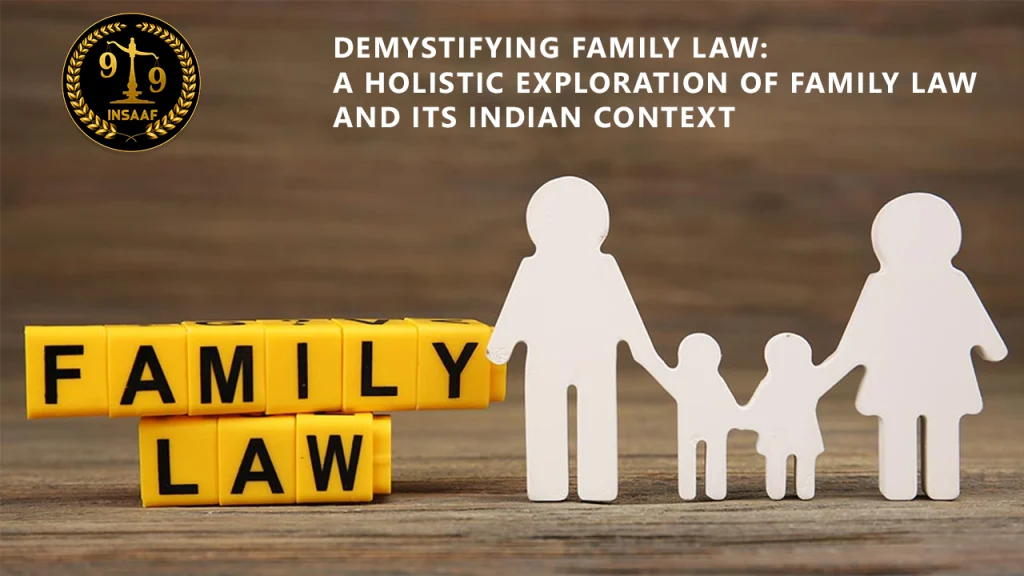

Online Legal Advice from Insaaf99® Online Lawyer Consultation in India


Online Legal Advice from Insaaf99® Online Lawyer Consultation in India

The Family Law in India is a crucial aspect of the legal system in India. The law covers various legal matters concerning the family. The family law is unique in its own way as it not only looks to provide justice but also considers the religious faith of the people while deciding on the governing rules and regulation. It is one single law that covers familial matters, including marriage, divorce, inheritance, and more. The law provides a structured legal framework for resolving disputes related to family matters and plays a crucial role in maintaining order within families and ensuring the protection of individuals' rights and interests. The law provides a legal system that not only covers a broad range of issues but also helps in governing the rights, and responsibilities within a family unit. In this article we will dive deep and provide details of Indian Family Law.
The family law affects the institution of marriage and it provides rules and regulation under which a marriage is recognized or legally dissolved. The various aspects of marriage from solemnization, registration, to dissolution comes under family law. The family law governs the institution of marriage, however, it recognizes the importance of personal law. Marriage acts like Hindu Marriage Act, Muslim Personal Law and Special Marriage Act are considered in India while dealing with marriage related issues. A marriage is validated under the rules and regulation outlined under these laws based on the faith of married persons. The issues related to maintenance, alimony, and property rights in the event of divorce are also addressed under this law.
The law governing divorce, separation and legal dissolution of marriage comes under Family Law. The personal law also plays an important role while deciding on the dissolution of marriage as grounds of divorce are subject to the jurisdiction and personal law. Some of the main grounds of divorce under various personal and jurisdiction are cruelty, adultery, desertion, conversion, mental illness, etc. During the divorce proceedings important decisions related to the future of separated couples are taken which includes, child custody, division of marital property and deciding upon the spousal support and maintenance.
The decision of child custody and guardianship is a very sensitive matter and needs to be taken with utmost care. The law makes the decision of child custody and guardianship based on the best interest of the child. During the divorce process the court assesses the capability of each parent to take care of the child. The court also takes into consideration the education and earning capability of the parent, child's age before deciding on child support accordingly. There are two important acts which play a vital role in deciding the child custody and guardianship are Hindu Minority and Guardianship Act, 1956, and the Guardians and Wards Act, 1890.
Adoption and guardianship law is something that governs the rules and regulations for parents wanting to adopt a child. The law ensures that the rights of adopting parents and the children remains protected. The law takes reference from personal laws and the Juvenile Justice (Care and Protection of Children) Act, 2015. Together these laws help in drawing the outlines for deciding the eligibility criteria and obligation for adopting a child. Furthermore, it also provides guidance regarding the responsibility that parents need to perform after the adoption.
The Family law plays an important role in safeguarding people against domestic violence, any physical abuse and emotional abuse within the family. When the situation within the family reaches a tipping point and converts into violence, abuse and creating unrest within the family, this law provides provision to address and resolve a domestic violence case legally. Depending on the severity of the offense and violence there is a provision of restraining order as well.
The family law also regulates the distribution of assets and property among family members and ensures the fair and equitable distribution by providing provisions for asset distribution. The law also provides provision for succession planning and deciding on the rightful heir in the event of the death by taking inspiration from personal laws. The family law governs both types of succession: testamentary succession and intestate succession and safeguards the rights of the rightful heirs of the deceased.
Maintenance and Financial Support: The family law is comprehensive law for legal matters related to family. It also provides protection for the dependents by providing provisions for the maintenance in case they are ignored, ensuring the well-being for the spouse, children and other dependents. Under the section 125 of the maintenance act it provides the provisions of financial assistance for the dependents like wives, children, and parents who are unable to support themselves.

Insaaf99 an online legal consultation platform provides comprehensive legal solutions for individuals dealing with family related disputes. Our legal services are easily accessible online, and we provide support with complex legal documentation, negotiation, mediation and courtroom representation. Our expert legal service provider evaluates your case and provides you with the best legal options and design strategy around your goals and interests. We understand the sensitive nature of family related matters, respect your privacy and maintain confidentiality. At Insaaf99 we are committed to provide guidance, support, and resources to the individuals who need to achieve fair and equitable resolutions to their legal disputes.
Conclusion: The family law in India becomes very crucial as it deals with various aspects of family related legal matters. It covers a wide range of issues like recognizing the marriage to dissolution of the marriage, protecting family members against physical abuse and domestic violence. Not only this it also governs the rules and regulation related succession planning and inheritance, it also protects the rights and well-being of the dependents by providing provision for financial assistance. Understanding the nuances of family law is essential for individuals and families to navigate issues such as marriage, divorce, child custody, inheritance, and domestic violence effectively.